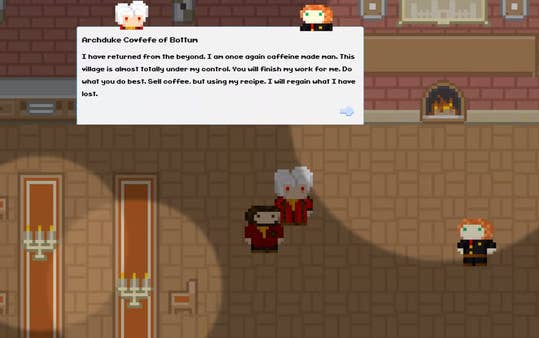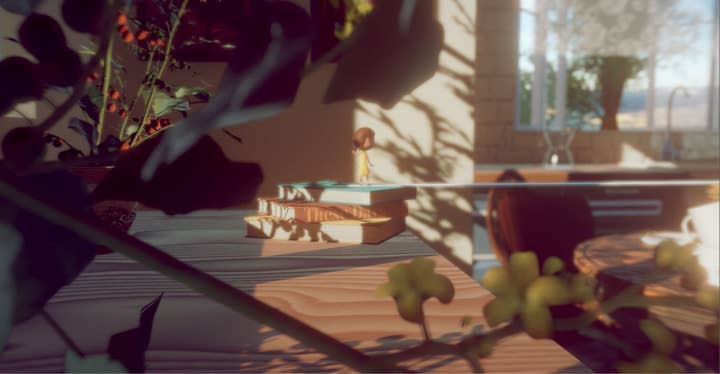Whitethorn Digital wants to be a "pleasing, small ship," not a galleon
CEO Dr. Matthew White pushes back against high publisher take-rates, aggressive growth, crunch, and capitalism
Dr. Matthew White makes no secret of how his personal politics and philosophies inform his choices as CEO of Whitethorn Digital.
White has been a part of the industry for over a decade in various roles, including building a game program at Penn State University, working in user research and analytics at Volition, and a stint at PlayStation as a senior data analyst. At the latter, White had a "crisis of conscience" and decided he'd had enough of large companies.
"The bigger an entity gets, the harder it is to steer the ship," he says of his decision to go indie. "There's a diseconomy of scale at a certain point where you're so large, and I use the Red Dead example all the time, someone literally just worked on horse testicles for four years and nothing else [White clarified later that this was an extrapolation to make a point, not a specific story he'd heard]. That scale is depressing to me."
With that notion, White departed PlayStation to move back to Pennsylvania, work for Keywords Studios, and found his own publishing label in Whitethorn Digital. There, he's pushing back against one of his biggest philosophical beefs: the way publishers interact with developers in relationships which he believes are frequently exploitative and harmful both to individuals and the industry as a whole.
"Every time we do deals that make developers disempowered, we do bad for our industry. It's like shitting in the pool you're swimming in"
"I'm a socialist," he says. "The means of production are with the developers. No developers, no publishers. No publishers, no distributors. No distributors, no games. The core of where the content comes from is the people actually sitting down and making games. Any arrangement that doesn't protect them is not only kind of shitty, but also bad for the industry. Every time we do deals that make developers disempowered, we do bad for our industry. We all have to sit and eat here, so it's like shitting in the pool you're swimming in. We're all in the same pool!
"One of the things I didn't like about the indie community is that publishers can be rather predatory. You see dumb, starry-eyed young persons and you say, 'I have a large check for you, give me everything you have.' I find that gross. There's a lot of that that still goes on. You hear about 50% to 70% cuts of the revenue, 300% recoup, creative control, perpetual contracts, IP leasing, and all these nasty things designed to basically hoodwink starry-eyed dreamers out of their starry-eyed dreams in exchange for what to them seems like a large check but in reality is a pittance compared to what the publisher gets."

White went on to reference a social media conversation from August (the original tweet has since been deleted) where numerous indie developers weighed in on the idea of a 50% revenue share with a publisher. Some, such as Mike Rose and Rami Ismail, remarked that such a split made up the "overwhelming majority" of publisher deals. Others were shocked that a publisher share could get that high. White doesn't believe it ever has to.
"A venture capitalist will tell you, 'Sure, I'm taking 90% of your company, but you'll own 10% of a company worth $100 million, instead of 100% of a company worth nothing.' That logic is kind of spurious though, because they don't guarantee that. In fact, they specifically legally disclaim it in all their agreements. No guarantee of performance. So for every time a publisher picks up something and it flops, the developer is literally destitute. Now they own 10% of something that made $10,000, and the publisher doesn't care. They get their recoup, whatever. No obligation to intervene. I just don't like that business model, at all."
"I don't think [unions and CEOs] have to have adversarial relationships"
One argument White wants to refute is the idea that a higher publisher share is needed depending on what the publisher does for the developer. Whitethorn, he says, does "porting, localization, Q/A, testing, certification, distribution, legal, taxes, business," and the maximum cut the company will take is 20%. He points out that he can keep his revenue share down with a "mindset of frugality," setting up shop in a place with a cheap cost of living (Erie, Pennsylvania), and not "spending a million bucks rolling up to E3."
White's philosophies also extend to the rest of his business. Whitethorn currently consists of six full-time employees plus a few contractors, many of whom work remotely, and according to White all work strictly 40-hour weeks. The studio is anti-crunch, pro-union, and hired paid interns over the summer.
I ask White how he squares his public pro-union stance with the fact that he himself is a CEO of a small company that isn't itself unionized. He notes that at Whitethorn, employees and developers within the publishing group all have voting rights in the company, and adds that he is the lowest-paid person at the company.
"I don't think [unions and CEOs] have to have adversarial relationships," he says. "A lot of the things the unions are fighting for are...basic things. Working conditions that make sense, healthcare, rights and protections from sexual assault in your workplace, things we're all fighting for.
"We don't make steel, we don't make utility, we don't make energy, we make fun. Joy. How odd that it should be so unbelievably hard on people to do something that's supposed to be fun"
"It's a lot to think that you as a business owner should be at odds with a worker. It's weird, it's a false dichotomy that capitalism puts on you. I have money, you want money, so we're in this power struggle. If you just reframe the way you run your business to, 'I have some money, you help me make more money, let's make money together,' it becomes a very different thing. And there's a direct correlation between the type of work our devs do and how good they feel about their lives. The harder you work them, the worse the content that comes out is.
"Our net product is joy. The end goal of our industry is to make people smile and have a fun time. We don't make steel, we don't make utility, we don't make energy, we make fun. Joy. How odd that it should be so unbelievably hard on people to do something that's supposed to be fun.
"We don't have the mechanisms for putting a union in the industry yet. We are pro-union. When it happens, I will be there voting yes."

White is also unsurprisingly anti-venture capitalist, at least where his company is concerned. He asserts that Whitethorn is entirely bootstrapped, and will never seek or accept investor funding (though he adds he's fine with state-sponsored funds for job creation or similar accelerators).
"That cycle of hire and shed, hire and shed, is one of the grossest things about our industry. And is a direct result of a capitalistic imperative to grow"
"A venture capitalist doesn't want you to grow over 20 years, slowly," he says. "It's, give you a million dollars, give ten other people a million dollars, and hope one of you gives me $100 million in a year, and repeat that process until everyone is burned out and society is dead. They are here to just mine creativity. And to be clear, many people have super good investors that are an awesome business deal for them. Not every investor on earth is a piece of crap. But we've definitely seen way too many of our friends in little start-ups have nasty pump-and-dump deals where they're mined like Disney child stars until there's nothing left and they cast them off and take their money. That's what we don't want to be."
That slow growth White mentions is exactly what he wants for Whitethorn Digital. Though the publisher is small now at two years in, he says his ideal studio size is around 30 people, and that's where he'd like to get to...and stop.
"I don't think I could reasonably make this margin work if we get much higher than that," he says. "And that's what important to me. I don't want to be a massive island. A pleasing, small ship with a good crew. That's the goal. We can't be Activision, and we don't want to be. Not because they're bad people, but because I don't want to be. I never want to have to lay off a big swathe of people in my life. If I have to do that, I've done something very wrong. If I have to lay off one person and give them a big severance pay because I've screwed up, that's on me. But if I have to crush an entire team of 100 people. have security lock the doors, walk them out crying, give everyone else a layoff lunch...that's where I never want to be."
"A capitalist system wants you to grow. Wants you to be bigger, and in entertainment, that doesn't really work. No matter how good you make something. You can make a phenomenal title that doesn't sell super well. That happens. And knowing that risk is there, growing aggressively is a really silly move, I think.
"If every time you have a great hit, assuming your next one is also going to be a great hit, you grow 500%, in ten years, are you 12,000 employees? You can't. Eventually the break-even becomes so astronomically high that inevitably you have to shed people. That cycle of hire and shed, hire and shed, is one of the grossest things about our industry. And is a direct result of a capitalistic imperative to grow."









